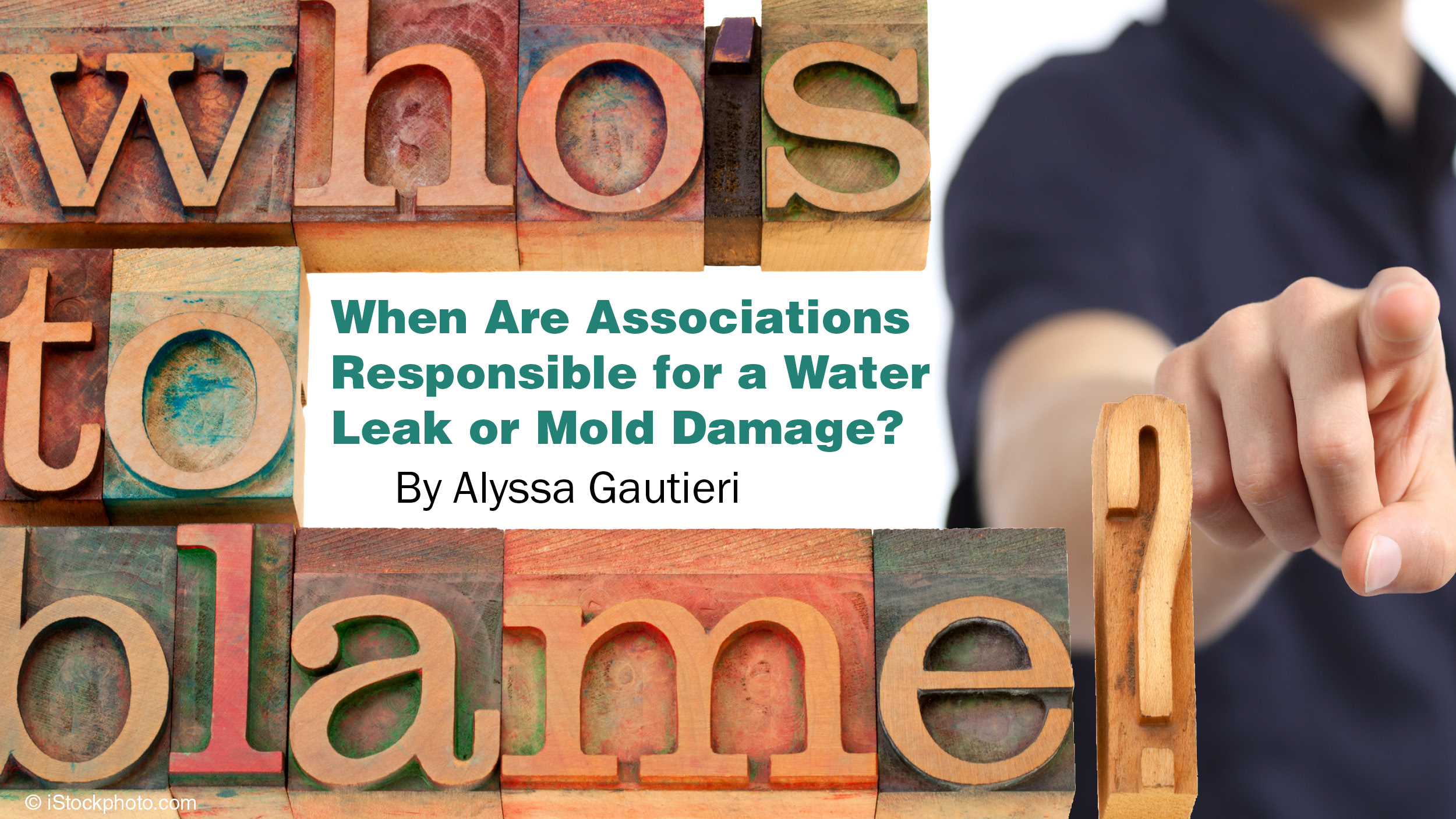
When Are Associations Responsible for a Water Leak or Mold Damage?
A condominium receives a call from an owner who claims his roof is leaking. The association sends maintenance to the unit and the leak is fixed within 15 minutes. The owner argues that the association should pay for interior damage allegedly having resulted from this leak. Who is liable for the damage?
We spoke with David Byrne, an attorney with Ansell, Grimm & Aaron, PC in Princeton, New Jersey, Chairperson of that firm’s Community Association Law Group, about this. We discussed an association’s responsibility in the case of a water leak, property damage or mold damage.
“An association is only responsible for damage proximately caused by a breach of duty. The association can be liable in some situations, but they are not responsible in every situation,” said Byrne.
He explained, when there is a complaint of a leak from an owner, the condominium must send maintenance to the unit to determine whether in fact there is a leak, and if so, whether it is a common element leak. If a common element leak, the association must fix the leak, to ensure the absence of a future leak. However, it may not be responsible for other damage that resulted from that leak.
“An association’s liability is determined on a case-by-case basis. Associations should fix the leak first, but they should not necessarily fix the inside damage or reimburse occupants in that regard,” said Byrne.
To determine whether it is liable, the condominium should investigate the cause of the leak. According to Byrne, if the leak is the result of a toilet backup in an adjacent unit, the condominium is not implicated as it had no duty to protect against toilet backups.
“The condominium has to decide who is responsible for the damage based on the facts presented,” he said.
An association may be liable in a case where it failed to react to a complaint in a timely manner involving something or some area for what it had/has responsibility, said Byrne. For example, a jury could find an association negligent if it ignored an email complaining about water stains on a ceiling of a unit that sits directly under the exterior roof.
To avoid being accused of negligence (or being found negligent), Byrne advised that associations should value communication with owners and act fast when there are complaints.
“A condominium can successfully argue that it was not negligent if it has a verifiable maintenance and inspection plan. An association should have inspection protocols, respond to complaints quickly, and keep a record of complaints,” he said.
A condominium that ignores a call about a roof leak for months may be responsible for the interior damage arising between the time of the call and the repair. Such inaction could be deemed negligence. However, a condominium that responds as quick as possible to that call would likely not be responsible.
Owners may disagree with the association. “Generally speaking, people aren’t going to agree with something that makes them pay money. If owners are smart they would have obtained insurance which generally helps to protect occupants in situations like this. Occupants in these situations may find themselves deciding whether it is worth a lawsuit to fight the association regarding damage,” said Byrne.
In the case of mold, associations have the same obligations. “An association should not care about mold unless the damage surrounding the mold was the result of the association’s negligence. To me, mold does not require special consideration, it is just damage,” said Byrne.
Very often, owners are responsible for mold damage because it is likely that an owner saw the mold develop in the unit and failed to mitigate or repair the damage. “Mold, even if it’s dangerous, occurs over extended periods of time, as a result of one’s failure to remove the conditions hospitable to the mold. The occupant likely knew or probably should have known that there was an issue, and should have reported it in a timely fashion,” said Byrne.
If a water leak or mold damage is found in a unit that is up for sale, the association’s obligation does not change. “Whether or not the association had an obligation to remediate damage with respect to the original owner is the same as its obligation with respect to its subsequent owner,” said Byrne.
“A condominium is not always responsible for damage that results from a leak, because sometimes leaks happen by no fault of anybody. Not every accident is the result of someone’s fault and that’s why most owners get insurance — because we can’t always control what happens in our daily life,” he said.